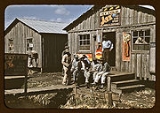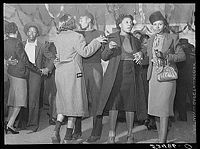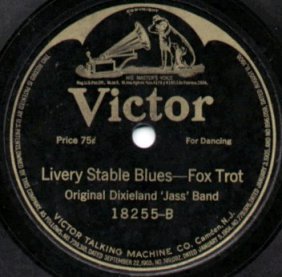
Juke joint
Encyclopedia

Vernacular
A vernacular is the native language or native dialect of a specific population, as opposed to a language of wider communication that is not native to the population, such as a national language or lingua franca.- Etymology :The term is not a recent one...
term for an informal establishment featuring music, dancing, gambling, and drinking, primarily operated by African American
African American
African Americans are citizens or residents of the United States who have at least partial ancestry from any of the native populations of Sub-Saharan Africa and are the direct descendants of enslaved Africans within the boundaries of the present United States...
people in the southeastern United States
United States
The United States of America is a federal constitutional republic comprising fifty states and a federal district...
. The term "juke" is believed to derive from the Gullah
Gullah language
Gullah is a creole language spoken by the Gullah people , an African American population living on the Sea Islands and the coastal region of the U.S...
word joog, meaning rowdy or disorderly. A juke joint may also be called a "barrelhouse".
Classic juke joints found, for example, at rural crossroads, catered to the rural work force that began to emerge after the emancipation
Emancipation
Emancipation means the act of setting an individual or social group free or making equal to citizens in a political society.Emancipation may also refer to:* Emancipation , a champion Australian thoroughbred racehorse foaled in 1979...
. Plantations workers and sharecroppers needed a place to relax and socialize following a hard week, particularly since they were barred from most white establishments by Jim Crow laws
Jim Crow laws
The Jim Crow laws were state and local laws in the United States enacted between 1876 and 1965. They mandated de jure racial segregation in all public facilities, with a supposedly "separate but equal" status for black Americans...
. Set up on the outskirts of town, often in ramshackle buildings or private houses, juke joints offered food, drink, dancing and gambling for weary workers. Owners made extra money selling groceries or moonshine
Moonshine
Moonshine is an illegally produced distilled beverage...
to patrons, or providing cheap room and board.
History

Shotgun house
The shotgun house is a narrow rectangular domestic residence, usually no more than 12 feet wide, with doors at each end. It was the most popular style of house in the Southern United States from the end of the American Civil War , through the 1920s. Alternate names include shotgun shack,...
"-style dwelling, these may have been the first juke joints. During the prohibition in the United States
Prohibition in the United States
Prohibition in the United States was a national ban on the sale, manufacture, and transportation of alcohol, in place from 1920 to 1933. The ban was mandated by the Eighteenth Amendment to the Constitution, and the Volstead Act set down the rules for enforcing the ban, as well as defining which...
it became common to see squalid independent juke joints at highway crossings and railroad stops. These were almost never called "juke joint"; but rather were named such as the "Lone Star" or "Colored Cafe". They were often open only on weekends. Juke joints may represent the first "private space" for blacks. Paul Oliver writes that juke joints were "the last retreat, the final bastion for black people who want to get away from whites, and the pressures of the day."
Jooks occurred on plantations, and classic juke joints found, for example, at rural crossroads began to emerge after the Emancipation Proclamation
Emancipation Proclamation
The Emancipation Proclamation is an executive order issued by United States President Abraham Lincoln on January 1, 1863, during the American Civil War using his war powers. It proclaimed the freedom of 3.1 million of the nation's 4 million slaves, and immediately freed 50,000 of them, with nearly...
. Dancing was done to so-called jigs and reels (terms routinely used for any dance that struck respectable people as wild or unrestrained, whether Irish or African), to music we now think of as "old-timey" or "hillbilly
Hillbilly
Hillbilly is a term referring to certain people who dwell in rural, mountainous areas of the United States, primarily Appalachia but also the Ozarks. Owing to its strongly stereotypical connotations, the term is frequently considered derogatory, and so is usually offensive to those Americans of...
". Through the first years of the twentieth century, the fiddle
Fiddle
The term fiddle may refer to any bowed string musical instrument, most often the violin. It is also a colloquial term for the instrument used by players in all genres, including classical music...
was by far the most popular instrument among both white and black Southern musicians. The banjo
Banjo
In the 1830s Sweeney became the first white man to play the banjo on stage. His version of the instrument replaced the gourd with a drum-like sound box and included four full-length strings alongside a short fifth-string. There is no proof, however, that Sweeney invented either innovation. This new...
was popular before guitar
Guitar
The guitar is a plucked string instrument, usually played with fingers or a pick. The guitar consists of a body with a rigid neck to which the strings, generally six in number, are attached. Guitars are traditionally constructed of various woods and strung with animal gut or, more recently, with...
s became widely available in the 1890s.
Juke joint music began with the black folk rags ("ragtime
Ragtime
Ragtime is an original musical genre which enjoyed its peak popularity between 1897 and 1918. Its main characteristic trait is its syncopated, or "ragged," rhythm. It began as dance music in the red-light districts of American cities such as St. Louis and New Orleans years before being published...
stuff" and "folk rags" are a catch-all term for older African American music) and then the boogie woogie dance music of the late 1880s or 1890s and became the blues, barrel house, and the slow drag dance music of the rural south (moving to Chicago
Chicago
Chicago is the largest city in the US state of Illinois. With nearly 2.7 million residents, it is the most populous city in the Midwestern United States and the third most populous in the US, after New York City and Los Angeles...
's black rent-party circuit in the Great Migration
Great Migration (African American)
The Great Migration was the movement of 6 million blacks out of the Southern United States to the Northeast, Midwest, and West from 1910 to 1970. Some historians differentiate between a Great Migration , numbering about 1.6 million migrants, and a Second Great Migration , in which 5 million or more...
) often "raucous and raunchy" good time secular music. Dance forms evolved from ring dances to solo and couples dancing. Some blacks, those seeking white approval, opposed the amorality of the raucous "jook crowd".
Until the advent of the Victrola, and juke boxes, at least one musician was required to provide music for dancing, but as many as three musicians would play in jooks. In larger cities like New Orleans, string trios or quartets were hired.

Paul Oliver
Paul Oliver
-Biography:Oliver was a researcher at the Oxford Institute for Sustainable Development , and from 1978-88 was Associate Head of the School of Architecture. He is an Honorary Fellow of the Royal Institute of British Architects and was awarded an Honorary Doctorate by the University of Gloucestershire...
, who tells of a visit to a juke joint outside of Clarksdale
Clarksdale
Clarksdale may refer to some places in the United States:*Clarksdale, Illinois, unincorporated community in Christian County*Clarksdale, Indiana, unincorporated community in Brown County*Clarksdale, Mississippi, city in Coahoma County...
some forty years ago and was the only white man there, describes juke joints of the time as, "unappealing, decrepit, crumbling shacks" that were often so small that only a few couples could Hully Gully
Hully Gully
The Hully Gully is a type of unstructured line dance often considered to have originated in the sixties, but is also mentioned some forty years earlier as a dance common in the black juke joints in the first part of the twentieth century. In its modern form it consisted of a series of "steps" that...
. The outside yard was filled with trash. Inside they are "dusty" and "squalid" with the walls "stained to shoulder height".
In 1934, anthropologist Zora Neale Hurston
Zora Neale Hurston
Zora Neale Hurston was an American folklorist, anthropologist, and author during the time of the Harlem Renaissance...
made the first formal attempt to describe the juke joint and its cultural role, writing that "the Negro jooks...are primitive rural counterparts of resort night clubs, where turpentine workers take their evening relaxation deep in the pine forests." Jukes figure prominently in her studies of African American folklore
Folklore
Folklore consists of legends, music, oral history, proverbs, jokes, popular beliefs, fairy tales and customs that are the traditions of a culture, subculture, or group. It is also the set of practices through which those expressive genres are shared. The study of folklore is sometimes called...
.
Early figures of blues, including Robert Johnson, Son House
Son House
Eddie James "Son" House, Jr. was an American blues singer and guitarist. House pioneered an innovative style featuring strong, repetitive rhythms, often played with the aid of slide guitar, and his singing often incorporated elements of southern gospel and spiritual music...
, Charley Patton, and countless others, traveled the juke joint circuit, scraping out a living on tips and free meals. While musicians played, patrons enjoyed dances with long heritages in some parts of the African American community, such as the Slow Drag
Slow drag (dance)
The Slow drag is an American social dance originally performed to ragtime music, and has been resurrected as part of blues dancing.-History:Ragtime composers, including Scott Joplin, wrote a number of slow-tempo tunes appropriate for the dance...
.
Many of the early and historic juke joints have closed over the past decades for a number of socio-economic reasons. Po' Monkey's
Po' Monkey's
Po' Monkey's lounge is located in unincorporated Bolivar County, Mississippi outside of Merigold. Located in the Mississippi Delta, it is a juke joint located in cotton fields in a one-room house...
is one of the last remaining rural jukes in the Mississippi Delta
Mississippi Delta
The Mississippi Delta is the distinctive northwest section of the U.S. state of Mississippi that lies between the Mississippi and Yazoo Rivers. The region has been called "The Most Southern Place on Earth" because of its unique racial, cultural, and economic history...
.
It began as a renovated sharecropper's shack which was probably originally built in the 1920s or so. Po' Monkey's features live blues music and "Family Night" on Thursday nights. Still run by Po' Monkey, the popular juke joint has been featured in national and international articles about the Delta. The Blue Front Cafe
Blue Front Cafe
The Blue Front Cafe is a historic old juke joint made of cinder block in Bentonia, Mississippi on Highway 49, approximately 30 miles northwest of Jackson, which played an important role in the development of the blues in Mississippi. The cafe has been given a marker and officially placed on the...
is a historic old juke joint made of cinder block
Cinder block
In the United States, a concrete masonry unit – also called concrete block, cement block, and foundation block – is a large rectangular brick used in construction. Concrete blocks are made from cast concrete, i.e. Portland cement and aggregate, usually sand and fine gravel for high-density blocks...
s in Bentonia
Bentonia, Mississippi
Bentonia is a town in Yazoo County, Mississippi, United States. The population was 500 at the 2000 census. Some blues scholars maintain that there is a "Bentonia School" of blues singing and guitar-playing, and that "Bentonia-style" is a distinct style of Delta Blues, but Bentonia lies outside the...
, Mississippi
Mississippi
Mississippi is a U.S. state located in the Southern United States. Jackson is the state capital and largest city. The name of the state derives from the Mississippi River, which flows along its western boundary, whose name comes from the Ojibwe word misi-ziibi...
which played an important role in the development of the blues
Blues
Blues is the name given to both a musical form and a music genre that originated in African-American communities of primarily the "Deep South" of the United States at the end of the 19th century from spirituals, work songs, field hollers, shouts and chants, and rhymed simple narrative ballads...
in Mississippi. It was still in operation as of 2006. Smitty's Red Top Lounge in Clarksdale, Mississippi
Clarksdale, Mississippi
Clarksdale is a city in Coahoma County, Mississippi, United States. The population was 20,645 at the 2000 census. It is the county seat of Coahoma County....
, is also still operating as of last notice.
Urban juke joint
Peter GuralnickPeter Guralnick
Peter Guralnick is an American music critic, writer on music, and historian of US American popular music, who is also active as an author and screenwriter. He has been married for over 45 years to Alexandra...
describes many Chicago
Chicago
Chicago is the largest city in the US state of Illinois. With nearly 2.7 million residents, it is the most populous city in the Midwestern United States and the third most populous in the US, after New York City and Los Angeles...
juke joints as corner bars that go by an address and have no name. The musicians and singers perform unannounced and without microphones, ending with little if any applause. Guralnick tells of a visit to a specific juke joint, Florence's, in 1977. In stark contrast to the streets outside, Florence's is dim, and smoke-filled with the music more of an accompaniment to the "various business" being conducted than the focus of the patrons' attention. The "sheer funk of all those closely-packed-together bodies, the shouts and laughter" draws his attention. He describes the security measures and buzzer at the door, there having been a shooting there a few years ago. On this particular day Magic Slim
Magic Slim
Magic Slim is an American blues singer and guitarist.-Biography:Magic Slim was forced to give up playing the piano when he lost his little finger in a cotton gin mishap. He moved first to nearby Grenada. He first came to Chicago in 1955 with his friend and mentor Magic Sam...
was performing with his band, the Teardrops, on a bandstand barely big enough to hold the band.
Katrina Hazzard-Gordon writes that "[t]he honky-tonk
Honky tonk
A honky-tonk is a type of bar that provides musical entertainment to its patrons...
was the first urban manifestation of the jook, and the name itself later became synonymous with a style of music. Related to the classic blues in tonal structure, honky-tonk has a tempo that is slightly stepped up. It is rhythmically suited for many African-American dances…", but cites no reference.
Legacy
The low-down allure of juke joints has inspired many large-scale commercial establishments, including the House of BluesHouse of Blues
House of Blues is a chain of 13 live music concert halls and restaurants in major markets throughout the United States. House of Blues first location was in Cambridge's Harvard Square. It was opened in 1992 by Isaac Tigrett, co-founder of Hard Rock Cafe, and Dan Aykroyd, star of The Blues Brothers...
chain, the 308 Blues Club and Cafe in Indianola, Mississippi
Indianola, Mississippi
Indianola is a city in Sunflower County, Mississippi, United States. The population was 12,066 at the 2000 census. It is the county seat of Sunflower County.-History:...
and the Ground Zero
Ground Zero (blues club)
Ground Zero is a blues club in Clarksdale, Mississippi that is co-owned by Morgan Freeman, attorney Bill Luckett, and Memphis entertainment executive Howard Stovall. It got its name from the fact that Clarksdale has been historically referred to as "Ground Zero" for the blues. It opened in May...
in Clarksdale, Mississippi
Clarksdale, Mississippi
Clarksdale is a city in Coahoma County, Mississippi, United States. The population was 20,645 at the 2000 census. It is the county seat of Coahoma County....
. Traditional juke joints, however, are under pressure from other forms of entertainment, including casinos. Many get more business from tourists in search of an authentic blues experience than local patrons. The annual Juke Joint Festival in Clarksdale was founded in 2004 to foster appreciation for local jukes and promote their preservation.
Jukes have been celebrated in photos and film. Marion Post Wolcott
Marion Post Wolcott
Marion Post was a noted photographer who worked for the Farm Security Administration during the Great Depression documenting poverty and deprivation. She was born in New Jersey. Her parents split up and she was sent to boarding school, spending time at home with her mother in Greenwich Village...
's images of the dilapidated buildings and the pulsing life they contained are among the most famous documentary images of the era.
External links
- A collection of Juke Joint Blues musicians and playlists
- Random House Word of the Day . Accessed 2006-02-02.
- Junior's Juke Joint. Accessed 2006-02-01.
- Juke Joint Festival. Accessed 2006-02-02.
- Jukin' It Out: Contested Visions of Florida in New Deal Narratives
- Juke Joint video
- Juke Joint at Queens

